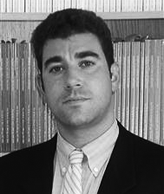Progress Reported in Advanced Esophageal Cancer
Meeting podcast: Listen to nationally regarded GI cancer specialist and clinical researcher, Peter C. Enzinger, MD, Assistant Professor of Medicine, Dana-Farber Cancer Institute, discuss new developments and trends in the management of esophageal cancer.
Peter C. Enzinger, MD

Meeting podcast: Listen to nationally regarded GI cancer specialist and clinical researcher, Peter C. Enzinger, MD, Assistant Professor of Medicine, Dana-Farber Cancer Institute, discuss new developments and trends in the management of esophageal cancer. At the American Society of Clinical Oncology meeting in 2009, Dr. Enzinger presented a session titled, ‘What's new in chemotherapy treatment for esophageal cancer.’ Now, a year later at the 2010 meeting, we asked him if there is anything new in this very difficult clinical scenario.
“In 2009, the big story in esophageal cancer was actually what was going on in gastric cancer since most of these cancers are at the gastro-`esophageal junction. In the ToGA study, presented at the 2009 meeting (a randomized phase III trial investigating trastuzumab (Herceptin) in patients with inoperable locally advanced, recurrent and/or metastatic HER2-positive gastric cancer) trastuzumab had shown significant activity boosting the response rate by 10% in GE junction and gastric cancers and prolonging survival by approximately 2 months,” said Dr. Enzinger, pointing out that since most of these cancers are at the GE junction it does not make sense not to include esophageal cancers as part of this paradigm. “So for the past year we have been expanding the role of trastuzumab in both esophageal and gastric cancers.”
During this year’s meeting, Dr. Enzinger will present results from a phase II study in 245 patients with esophageal cancer who were randomized to three standard chemotherapy regimens, ECF (epirubicin, cisplatin, fluorouracil), IC (irinotecan, cisplatin), and FOLFOX (leucovorin, fluorouracil, oxaliplatin). “The idea behind the study was to find a well-tolerated regimen that had significant activity that could then be used against the standard of care,” said Dr. Enzinger.
Stay tuned on this page for more 2010 meeting coverage from Dr. Enzinger, and from other key opinion leaders sharing their expert perspectives on highlights of selected sessions and abstracts.
-Interviewed by Ron Piana
Tiragolumab Combo Improves PFS/OS Vs Chemo in Esophageal Cancer
January 20th 2024Data from the phase 3 SKYSCRAPER-08 trial may support tiragolumab plus atezolizumab and chemotherapy as an alternative frontline treatment option for those with locally advanced or metastatic esophageal squamous cell carcinoma.
Lenvatinib Combo Demonstrates Safety, Activity in Metastatic ESCC
October 23rd 2023Investigators will continue to assess the efficacy and safety of lenvatinib plus pembrolizumab and chemotherapy as frontline treatment for patients with metastatic esophageal squamous cell carcinoma in part 2 of the LEAP-014 study.